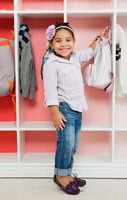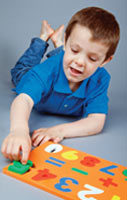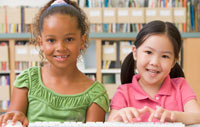Job Search
Tinies has hundreds of childcare jobs across the UK
Our Favourite Ways of Understanding the EYFS Part 7: 3 - 5 Years
In the last part of our series on the EYFS we follow your child's development as they leave toddlerhood behind and prepare to start school
In the series on the Early Years Foundation Stage (EYFS) we're running, we're exploring each stage in detail and helping you understand how they apply directly to your child. This will also help you understand the kinds of things you can be doing with them at home to help them learn.
As a quick reminder, there are 7 stages; 3 primary and 4 specific areas of learning. You will notice the stages overlap - this is an indication that every child will develop at their own rate, and EYFS should be used as a guideline. We have broken each stage into parts so that they are easy to digest and you'll become familiar with what to expect as they grow.
EYFS: the Basics
EYFS: the Basics
EYFS: Birth to 11 months
EYFS: 8 - 20 months
EYFS: 16 - 26 months
EYFS: 22 - 36 months
EYFS: 2 - 3 years
EYFS Primary Areas of Learning 3-5 Years
Personal, Social and Emotional Development
Making relationships
- I like to talk with my friends and grown-ups and tell them what I know about the things they talk about.
- I can tell you what I know about things I like to play with or things that I like to do. I ask grown-ups and my friends questions to find out more about the things I like.
- I can help my friends to be friends again when they fall out or are cross with each other.
Self confidence and self awareness
- I can tell my friends and grown-ups what I need, what I want, what I like to do, and if I like or don't like something.
- I can tell you what I like to do and what I am good at doing, like drawing or running.
Managing feelings and behaviour
- I know that if I take my friend's toy or shout at them they might get upset or cross. When I make my friend upset or cross I might get upset too or I might try to give them a hug.
- I know what I should do to help me and my friends share things, keep safe and be happy.
- I am beginning to be able to tell my friends what they could do to help me if they take my toys or make me upset or cross.
Physical Development
Moving and handling
- I like to move in different ways like running, skipping, hopping, jumping or rolling.
- I can jump off a step and land on two feet.
- When I play chasing or racing games I can slow down or change direction to not bump into things.
- I can move on my feet, back and front to get over, under, along or through tunnels, climbing frames and steps.
- I can push, pat, throw, catch or kick things like a large ball, a balloon or piece of fabric.
- I can use scissors to cut paper or cutters to make shapes from dough.
- I can use things like scissors, paintbrushes, pens, hammers or bricks to make what I want.
- I choose to use either my left or right hand more to hold things like pens or scissors.
- When I draw, I start to make anti-clockwise circles and lines that go down-up and up-down.
- I can hold a pen or pencil and use it to write letters you can begin to recognise. The letters I write are a mix of capital and lower case, and will usually begin and end in the right place.
Health and self-care
 I like to eat different types of fruit and vegetables.
I like to eat different types of fruit and vegetables.- I can go to the toilet by myself.
- I can tell you about different ways of keeping healthy, like washing hands before eating, drinking water when thirsty, eating fruit or vegetables, and running or jumping.
- I can show you how I use things like scissors, hammers and saws safely so I don't hurt myself or my friends.
- I can tidy toys away so that I don't fall over them and hurt myself.
- I can use things like scissors, a hammer and a saw safely without help from a grown up.
Communication and Language Development
Listening and attention
- When I am singing rhymes or songs, or sharing a story with a grown up, I am able to listen really carefully to what is happening.
- I can listen to what you tell me you want me to do and then I can do it.
Speaking
- I can use lots of words to tell you about something that I have made or something that I have done.
- I like you to use new words to talk to me about what I am doing or what I am using. Then I like to try to use these new words as I am playing.
- I can pretend to be different people and can pretend to do different things, like being a nurse and making sick patients better with bandages and care.
- I can use words like "first", "next" and "then" when I am telling you a story or telling you about something I have done.
- When I am dressing up or playing with toy people I like to make up stories using what I know, what I have seen or what I have heard to help me.
EYFS Specific Areas of Learning
Literacy
Reading
- I can tell you lots of words that rhyme.
- I can hear and tell you the first sound in a word when you say the word.
- I can say the sounds in a short word like "cat". When you say each of the sounds like "c-a-t" I can put the sounds together and tell you the word. I can write each of the letters too.
- I can read short sentences which are made of words like "the" or "and" and words that I can say each of the sounds in like "hat" or "dog".
- I use my favourite stories to help me make up my own stories when I am dressing up or using toy people or animals.
- I like to share different books like comics, stories, rhymes and magazines with you.
- When I am interested in things, I can look in books or on websites to find out more things.
Writing
- I can tell you what the marks, shapes, letters and pictures that I make mean.
- I know when I say a word you can write it and the letters you use make up the word I say.
- I can hear and tell you the first sound in a word when you say the word.
- I can tell you the names and sounds of each of the letters in the alphabet.
- I am beginning to use letters in my writing. Sometimes I write the right letter with the sound I make as I say the word.
- I can write my name.
- I can write labels for things to sell when I am playing "shops".
- I can write a short caption, like "My big car" to tell you what I have made with boxes.
- I try to write short sentences like "I can jump" when I am making a book about me.
Mathematics
Numbers
 I can recognise numbers that are important to me like my age, my house number or the bus number that I go to nursery on.
I can recognise numbers that are important to me like my age, my house number or the bus number that I go to nursery on.- I can recognise the numbers 1 to 5.
- I can touch one thing and say the number at the same time to help me count up to 3 or 4.
- I can count the number of things on a page in a book or on a birthday card.
- I can match the right number to a group of things from 1 to 5 to start, and then from 1 to 10.
- I can guess how many things are in a bucket and then count them to see how close I was.
- I can tell you which basket or bucket has got "more" or "fewer" things in.
- I can put two baskets of things together and tell you how many things I have altogether.
- I can tell you what "one more" or "one less" is when you give me a group of up to 5 things, then up to 10 things.
- I can use words like "more", "add", "less" and "take away".
- I can use marks and pictures to show you my counting.
- I can use counting to help me solve problems that are important to me, like splitting my sandwich in half to share with my friend.
Shape, space and measurement
- I am beginning to use shape names like "circle", "square", "cube" and "cylinder".
- When I am playing on an obstacle course I can use words like "under", "behind", "on" or "in" to tell you where I am.
- I can tell you which thing is "heavy" and which thing is "light" when you give me 2 things. I can tell you which thing is "full" and which thing is "empty" when I am filling and emptying bottles.
- I can use things to make patterns, like buttons and bricks.
- I am beginning to use words like "money", "pound" and "pence" when playing shop.
- I know the order I put my clothes on.
- I can tell you what is happening tomorrow or what happened yesterday. I can tell you what day today is.
Understanding the World
People and communities
- I like to join in with routines, like going shopping, and times that are special to me and my family, like birthdays.
- I know that my friends might do things differently to me, like eating different foods at home, or we might have different times that are special with our families such as Eid, Diwali, Easter, Passover, or Chinese New Year.
The world
- I can talk about how things, like flowers or buildings look the same or look different.
- I can talk about the patterns in things I see around me, like bricks or leaves.
- I can talk about how things change, like the seeds growing into sunflowers or the block of ice melting into water.
Technology
- I can use a painting program on the computer or tablet to draw a picture.
- I can use different things like a digital microscope, camera or microphone with a computer.
- I ask questions about how technology works.
- I know that a computer or remote control toy may need to be plugged in or have a battery in it to make it work.
Expressive Art and Design
Exploring and using media and materials
- I have favourite songs and dances and can tell you which one I want when you ask me.
- I can tap, shake, scrape and hit musical instruments to find out the different sounds I can make.
- I can mix my own paint using powder or ready mixed paints.
- I can choose the things like paper, material or ribbon that I want to use to make a picture.
- I like to use lots of different things like paint, paper, wool and material to make a picture.
- I can cut, stick and fold the things I want to use in my picture.
- I can use building toys, like bricks, and boxes to make the thing I want to make.
- I can use different things like scissors, masking tape, sticky tape, hole punches and string to join and fix things together.
- I can choose the things I want to use to make something. If my ideas don't work I can choose something else or change the way I do something.
- I can sing some familiar songs.
- I am beginning to move with rhythm, especially when I hear music I like.
- I can tap out simple repeated rhythms, especially to songs and rhymes I like.
Exploring and using media and materials
- I like joining in with dancing and ring games.
- I can make lots of noises with different things, like banging a spoon on my plate or popping bubble wrap.
- I know that I can join up lines on paper to make different shapes and I use these shapes to make things I know, like a face or a door.
- I like to find out more and talk about things that feel different, like the soft duvet cover or the shiny saucepan.
- I can use all sorts of building toys and empty cardboard boxes to make things.
- I make lines and piles of blocks, joining the pieces together to make things like houses and car parks.
- I know that I can use tools like scissors, spoons and hammers to do different things.
Being imaginative

- I am beginning to like some things more than others and sometimes I might like painting and drawing more than dancing or singing.
- I move around in different ways when I am happy or excited, sometimes I dance and jump up and down when I hear music.
- I sing to myself and I change songs I know to make up my own songs and rhythms.
- I notice the things that you do, like cooking and cleaning and I pretend to do the same.
- When something special has happened to me, I pretend play it happening, like feeding the new baby or my first swimming lesson.
- When I am playing with my toys, I make up stories like superheroes rescuing people from a building or animals eating grass.
- I use ordinary things and pretend they are something else, like a spoon is a fire hose and my bricks are fish fingers and chips.
- When we have done something exciting, I like to draw or paint a picture or make up a dance or song/rhyme.
